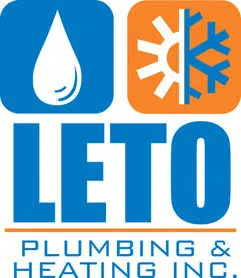HVAC FAQs
At Leto Plumbing & Heating, we aim to address the most common HVAC FAQs you might have regarding heating, ventilation, and air conditioning systems. Whether you’re seeking insights on system maintenance, energy efficiency, troubleshooting, or general HVAC knowledge, we’ve got you covered.
Our experts have compiled a comprehensive resource to help you better understand and navigate the world of HVAC, ensuring your comfort and peace of mind in your Plainfield, IL home.
How often should I change my HVAC system's air filters?
Regular air filter maintenance is crucial for the optimal performance of your HVAC system. In general, it’s recommended to change your HVAC system’s air filters every 1 to 3 months.
However, the frequency may vary based on factors such as the type of filter used, the number of occupants in your home, the presence of pets, and indoor air quality concerns. Neglecting filter changes can lead to reduced system efficiency, increased energy consumption, and even compromised indoor air quality.
What are the signs that my HVAC system might need repairs?
Recognizing the signs that your HVAC system might require repairs is essential for maintaining your comfort and system efficiency. Unusual noises, such as grinding, rattling, or banging, could indicate mechanical issues.
Inconsistent temperature control, where some areas of your home feel too hot or too cold, may also signal a problem. An unexpected increase in energy bills could be a sign of an inefficient system. If you notice poor airflow, unpleasant odors, or excessive humidity, it’s advisable to seek professional help.
How can I improve the energy efficiency of my HVAC system?
Improving the energy efficiency of your HVAC system is essential for reducing utility costs and minimizing your environmental footprint. Start by ensuring regular maintenance, such as cleaning or replacing air filters, as this allows air to flow freely and reduces strain on the system.
Consider upgrading to a programmable or smart thermostat, which lets you schedule temperature adjustments according to your daily routine. Additionally, adequate insulation and sealing of your home’s envelope can significantly reduce the workload on your HVAC system by maintaining a consistent indoor temperature.
What is the lifespan of a typical HVAC unit?
The lifespan of a typical HVAC unit can vary depending on factors such as its make, model, usage, and maintenance. Generally, well-maintained HVAC systems can last around 15 to 20 years.
Regular servicing, cleaning, and replacing components as needed can extend the longevity of your system.
What size HVAC system is appropriate for my home?
Determining the right size HVAC system requires considering factors like the square footage of your home, insulation levels, and local climate.
A professional HVAC technician can perform a load calculation to ensure an accurate fit for optimal efficiency and comfort.
How can I tell if my thermostat is functioning correctly?
If your thermostat isn’t maintaining the desired temperature or seems unresponsive, it might need calibration or replacement.
Checking for loose wires or batteries, and observing whether the temperature matches the setting can offer initial insights.
What is the purpose of HVAC zoning?
HVAC zoning allows you to regulate temperatures in different areas of your home independently. It enhances comfort and energy efficiency by directing heating or cooling only where needed, optimizing resources.
Are there any government rebates or incentives for upgrading to an energy-efficient HVAC system?
Yes, many regions offer rebates, tax credits, or incentives for upgrading to energy-efficient HVAC systems. These incentives can include tax credits, rebates, or even low-interest financing options for homeowners who choose to install energy-efficient heating and cooling systems.
It’s advisable to research and check with local utility companies or government agencies to determine the specific rebates or incentives available in your area, as they can vary based on location and program guidelines.
Taking advantage of these opportunities not only helps you save on upfront costs but also contributes to a more sustainable and environmentally friendly home.
What's the recommended temperature setting for energy savings during winter and summer?
For energy savings during winter, it’s generally recommended to set your thermostat to around 68°F (20°C) when you’re at home and awake. Lower the temperature a few degrees when you’re away or asleep to save energy.
During summer, aim for a setting around 78°F (26°C) when you’re at home, and consider raising it slightly when you’re away. These temperature ranges help balance comfort and energy efficiency, allowing your HVAC system to work efficiently while minimizing energy consumption.
How can I ensure proper ventilation in my home?
Regularly changing air filters, using exhaust fans in kitchens and bathrooms, and maintaining a balance between fresh outdoor air and conditioned indoor air can help ensure proper ventilation.
What should I do if my HVAC system is making unusual noises?
Unusual noises might indicate loose parts, clogs, or mechanical issues. It’s recommended to turn off the system and consult a professional HVAC technician to diagnose and address the problem.
What are some common reasons for uneven heating or cooling in different areas of my home?
Uneven heating or cooling can result from blocked vents, inadequate insulation, or improper ductwork design. Addressing these issues can help achieve consistent comfort throughout your home.
Are smart thermostats compatible with older HVAC systems?
Many smart thermostats are designed to work with a wide range of HVAC systems, including older ones. However, compatibility can vary, so it’s best to check the manufacturer’s recommendations.
What's the difference between a heat pump and a traditional air conditioning system?
While both systems are designed to cool indoor spaces, a heat pump offers an added capability – it can also heat spaces. A traditional air conditioning system is solely focused on cooling by removing heat from indoor air and expelling it outside.
In contrast, a heat pump can be reversed to extract heat from the outdoor air and transfer it indoors, providing heating during colder months.
How often should I schedule professional maintenance for my HVAC system?
It’s advisable to schedule professional HVAC maintenance at least once a year, ideally before the start of the heating and cooling seasons, to ensure optimal performance and catch any potential issues early.
What's the role of refrigerant in my air conditioning unit?
Refrigerant is a crucial substance that absorbs and releases heat, enabling your air conditioning unit to cool the air by transferring heat from inside to outside.
What are some DIY tasks I can do to maintain my HVAC system?
Maintaining your HVAC system through DIY tasks can greatly enhance its performance and longevity. Regularly replacing air filters, typically every 1 to 3 months, ensures proper airflow and reduces strain on the system. Clearing debris from around outdoor units promotes efficient operation. Keeping vents and registers unblocked maintains balanced air distribution.
Additionally, checking thermostat settings, cleaning evaporator, and condenser coils, and ensuring adequate insulation contribute to an optimally functioning HVAC system.
Remember that while DIY tasks are valuable, professional maintenance by experts like Leto Plumbing & Heating can address intricate issues and ensure comprehensive system health.
How can I determine if it's time to replace my aging HVAC unit?
Determining the right time to replace your aging HVAC unit involves assessing its performance, age, and efficiency. If your system frequently requires repairs, experiences uneven heating or cooling, or if your energy bills have significantly increased, it might be a sign that your HVAC unit is struggling.
Units over 10-15 years old might be less efficient and more prone to breakdowns. Upgrading to a newer, more energy-efficient model can provide improved comfort, lower operating costs, and reduce environmental impact.
Consulting a professional HVAC technician from Leto Plumbing & Heating can provide valuable insights into whether it’s time for a replacement based on your specific system and needs.
Can you recommend some tips for improving indoor air quality?
Changing air filters regularly, using air purifiers, ensuring proper ventilation, reducing indoor pollutants like smoking and harsh chemicals, and keeping your home clean can all contribute to improved indoor air quality.
If you’re still struggling with improving your indoor air quality, contact the professionals at Leto Plumbing & Heating for expert advice.
Still Have HVAC FAQs? Contact Leto Plumbing & Heating Today!
Still have HVAC FAQs about your heating and cooling systems? Don’t hesitate to get in touch with Leto Plumbing & Heating today! Our team of experienced professionals is here to provide you with expert guidance and solutions tailored to your HVAC FAQs and needs.
Whether you’re seeking advice on system maintenance, troubleshooting, or upgrading to energy-efficient options, we’re committed to delivering exceptional service and ensuring your comfort year-round.
Contact us now to have your HVAC FAQs answered and to experience the quality service that Leto Plumbing & Heating is known for.

We Proudly Service Plainfield, Naperville and Surrounding Areas
- Aurora
- Downers Grove
- Joliet
- Naperville
- Minooka
- Channahon
- New Lenox
- Sugar Grove
- Elmhurst
- Bolingbrook
- Westmont
- Lisle
- Oswego
- Plainfield
- Wheaton
- Woodridge
- Warrenville
- Lombard
- Oak Brook
- Burr Ridge
- Darien
- Romeoville
- Lemont
- Lockport
- Willowbrook
- Crest Hill
- Shorewood
- Carol Stream
- Hinsdale
- Indian Head Park
- LaGrange
- Countryside
- Clarendon Hills
- Wester Springs
- Winfield
- Glen Ellyn
- Montomery
- Yorkville
- Aurora
- Downer’s Grove
- Joliet
- Naperville
- Oswego
- Plainfield
- Wheaton
- Woodridge

